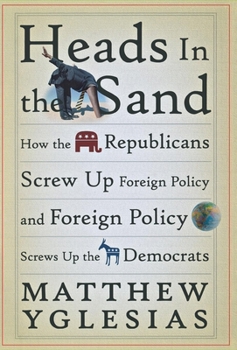Heads in the Sand: How the Republicans Screw Up Foreign Policy and Foreign Policy Screws Up the Democrats
Select Format
Select Condition 
Book Overview
Fast-rising political commentator Matthew Yglesias reveals the wrong-headed foreign policy stance of conservatives, neocons, and the Republican Party for what it is-aggressive nationalism. Writing with wit, passion, and keen insight, Yglesias reminds us of the rich tradition of liberal internationalism that, developed by Democrats, was used with great success by both Democratic and Republican administrations for more than fifty years. He provides...
Format:Hardcover
Language:English
ISBN:047008622X
ISBN13:9780470086223
Release Date:April 2008
Publisher:Trade Paper Press
Length:272 Pages
Weight:0.92 lbs.
Dimensions:1.0" x 6.0" x 8.5"
Customer Reviews
5 ratings
Good introduction and argument for an old way of doing foreign policy
Published by Thriftbooks.com User , 16 years ago
This book is an argument that Democrats' problems with foreign policy don't trace back to them not being "tough" enough but instead to their failure to offer an alternate vision. The framework that Yglesias is promoting is liberal internationalism which he ties into to Woodrow Wilson, FDR, Containment, and the first Gulf War. Much of the book is historical review, one that thankfully maintains the fast pace and wit of Yglesias's blog. Those who enjoy his blog should also enjoy the book, but it's also an excellent introduction to those who aren't already readers. The main value-added versus the blog is the ability to develop support for his ideas at length. He uses this opportunity well, although Yglesias does stick to qualitative analysis of Democrats electoral fortunes. The book contains no statistical analysis over whether Democrats offering a different foreign policy do better than other Democratic candidates. The specifics of "liberal internationalism" are rather straightforward. Build global institutions, work together with other nations, and try to understand the viewpoints of other nations. He supports the war in Afghanistan but thinks the war of in Iraq was inherently flawed and that complaining about implementation obscures the real problem. That said, the book is not a theoretical treatise. It sits firmly at the intersection between policy and politics and is in fact dubious of the value of big new ideas. All-in-all it's an interesting read for those dissatisfied with America's recent role in the world and looking for an achievable new direction.
Yglesias deserves more profile
Published by Thriftbooks.com User , 16 years ago
I've been an avid reader of Matt Yglesias's blog since long before he was assimilated into the Atlantic collective. On one hand, it's hard to take someone seriously as a foreign policy expert when they are no older than I am. On the other hand, he's incredibly smart and persuasive, and given the quality of our country's credentialed foreign policy experts, he's a much needed voice of sanity. If you're of the opinion that the intergovernmental institutions which are central to Yglesias's liberal internationalism are totally irredeemable, you may not be convinced otherwise by this book. But as a history of US foreign policy in the Clinton-Bush years, it is thorough, insightful, and funny. The postmortem of the Democrats' 2004 campaign strategy regarding the Iraq War is especially good. As Yglesias makes painfully clear, never has so much political cowardice yielded such counterproductive results.
Excellent book.
Published by Thriftbooks.com User , 16 years ago
Republicans always win foreign policy debates because Democrats don't even try. Democrats will keep losing until they participate. That's what Yglesias says and he's completely convincing and even entertaining. Yglesias smartly avoids making a specific foreign policy prescription, other than to follow the general internationalist approach that succeeded from Truman though Clinton. It's not so much that Democrats need to march in lockstep, it's just that they should stop running away. But I'll make my pitch for republican security theory, the idea that security means avoiding the extremes of anarchy and hierarchy. In practice it's pretty much the best of liberal internationalism and the small part of realism that makes sense, but the great thing about it is that it ties together approaches from antiquity to America's founding and all the way to the present. Lind's The American Way of War: A History of United States Military Strategy and Policy is a good read and I think an expression republican security theory. Deudney's Bounding Power: Republican Security Theory from the Polis to the Global Village is a tough read, but absolutely worth it.
Great book
Published by Thriftbooks.com User , 16 years ago
This book is definitely both highly readable and filled with great insights and ideas into liberal foreign policy. But, rather than put all of your trust in a reviewer you don't know, check out Matthew Yglesias' blog at The Atlantic for a more accurate idea of what the book is like. His blog, like his book, has some of the best political writing around, and is well worth checking out.
Well-argued, excellent book
Published by Thriftbooks.com User , 16 years ago
Everyone who reads books on foreign policy should read this book. It is well-argued throughout and gets at fundamentals, rather than just slinging the latest epithets over our latest blunders in Iraq. I don't in every way agree with the author's recipe for liberal internationalism but overall this is a smarter book than whichever other tome you are likely to pick up on foreign policy. Tyler Cowen





